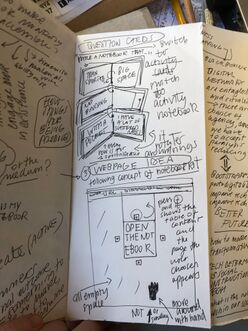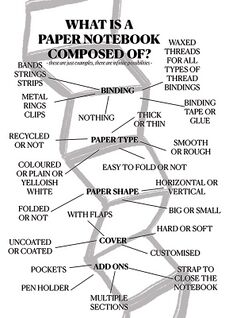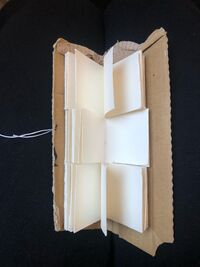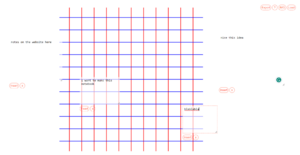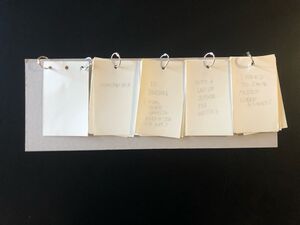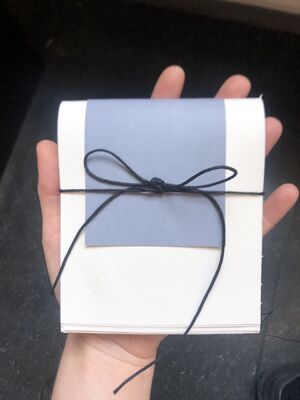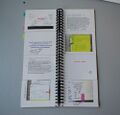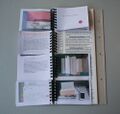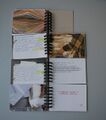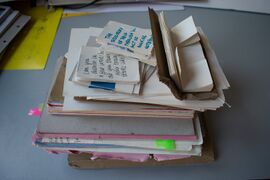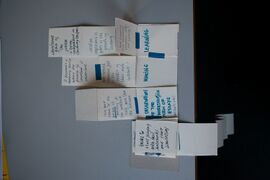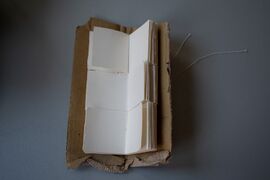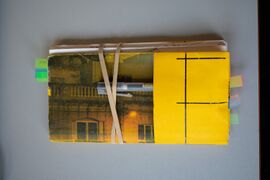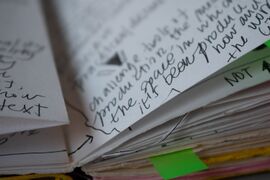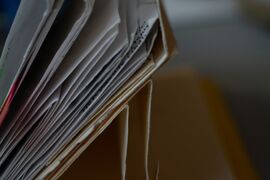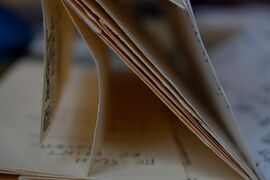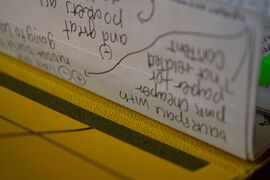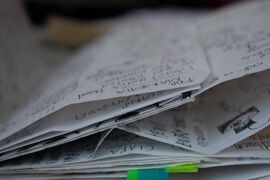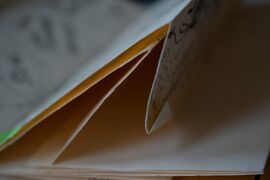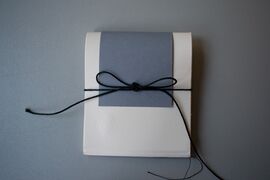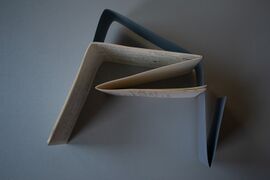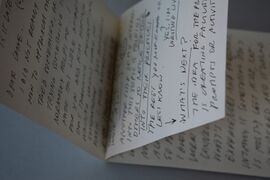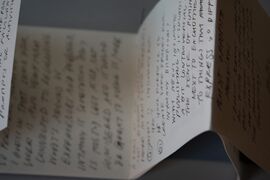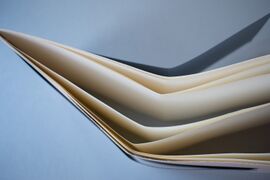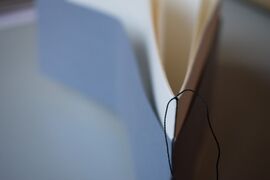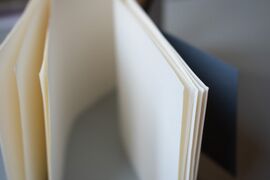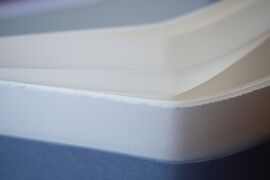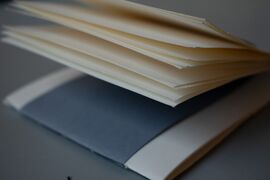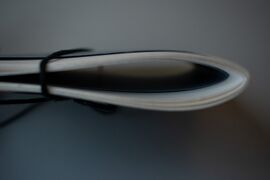User:FLEM/noteboox
Page where to leave all thoughts and ideas for the possible toolbox
maybe it's not gonna be a toolbox but it will be something
it's 19-04-23 and i am moving here to document the work towards graduation
general overview of the concept
Therefore, the final outcome will be a toolkit that will present, in different shapes, how to go through the analysis of self and the creation of personalised paper notebooks.
The Toolkit will be a box, probably, and will include a series of objects and materials:
- the thesis, printed on different papers, different sizes, every chapter, or paragraph will be different.
This version of the thesis will include a selection of photographs of the materials obtained in the last months, my notebooks, other people's notebooks, the CES, the experiments, the notes...
- different type of papers will be included, a cardboard to hold everything together, and other materials to help in the playground (metal rings, threads etc..)
- a "10 steps to make your own notebook", an instructional piece to go through different experiments.
it will include simple and accessible adds-on that users can use to start implementing their already-existing notebooks (like pockets, folding, additional papers..)
- a set of cards with questions to trigger the imagination
- a selection of short fictional stories based on the notebooks participants made during the sessions and influenced by the stories they told me.
These materials can be tried before the publications by participants or individuals that took part into my research.
ideas dump
to be elaborated
- "5 things to know about notebooks making"
- 10 steps to make your own notebook
- manifesto
- a "making a book" with the materials inside the "box"
- exercise/scheme of analysis of "personal notebook process"
- write a LEXICON as a way to explain things easily (what is your role into this practice?)
ideas development
exercise/scheme of analysis of "personal notebook process"
I need a series of questions that can describe it all in a few words.
| my personal notebook process | the ever-changing process a person can go through, by analysing and keeping attention to their individual note-taking activity and their use of paper notebooks to understand themselves and their needs. |
|---|---|
| What is the starting need that brought to the creation and use of it? | this question helps to highlight the starting point and main reason for the creation of a new notebook (or modification applied). it can be described in a few words. |
| What are the positive sides? Does it work within the starting purpose? | this is to understand if the solutions that have been found and applied to the new notebook are valid and working. this is important mostly not to lose track of the reasons underneath the concept and to evaluate how much the modifications worked. |
| What are the negative sides? What could be a different approach to solve the issue? | if what has been analysed above did not work, why didn't it work? analysing what worked and what did not help to reason on new ways to solve the issue that was not solved. |
| To try out: | a space to throw some ideas about practical solutions to apply to a possible new notebook or that can be applied directly to the version that is under monitoring. |
a second table for new ideas:
| new ideas for notebooks | |
|---|---|
| Need | being able to move the pages so that every space is a free space |
| Concept | write on separate sheets and then put them together with strings or rings |
| Pros | Different paper sheets so I can write separately and then decide how to organise the notes |
| Cons | It is annoying that I cannot add things to the text if the space is finished (absence of folded columns) |
Lexicon of practice
notebook
common book
The key word for the commonplace book is “annotated.” It is not just an anthology; the compiler reacts to the passages he has chosen or tells what the passages have led him to think about. A piece of prose, a poem, an aphorism can trigger the mind to consider a parallel, to dredge something from the memory, or perhaps to speculate with further range and depth on the same theme.
ephimera
scrapbook
scatchbook
diary
index cards
marginalia
book
user
maker
consumer
researcher
participant
accessible
notebook making
notes
05.04.23
Tutorial with Clara
With the main question we discussed about, when something is printed, does it stop to be a notebook? Can something printed still be a notebook?
We discussed about the limits of the pages, how basic paper books do not allow annotation because of the little space in the margins.
We also tried to define what is a notebook for us. I said that for me it is something that accompanying you in certain situations and offer a support. Clara said they are periodicals. They are positioned in a specific location, and during a certain period of time, where and when the user goes back recurrently.
What we discussed is also how many times, the uncomfortable of notebooks can come from certain anxieties we have in life and how we can transform those anxieties into notebooks features (e.g. how can I make a notebook public without thinking that what I write is stupid? can I use this anxiety to find a practical solution or feature that would help me?)
Task: we decided that I will start to scan all my notebooks.
Suggestions: "the godfather notebooks" by Coppola
what is a notebook for you?
17.04.23
tutorial with Manetta
Roll of my wiki page (User:FLEM/Notebook)
- what does it do/allow to do? what does it do differently?
- what does it not do/doesn't allow to do?
- how does it relate with the bigger project?
Work on the web page: how do i want to talk with others? as an invitation to my world. "here's a different approach to the act of making notebooks"
i printed and answered to everything in my notebook on 19-04-23
18.04.23
wait, what is experimental publishing again? by Aymeric M.
How to make notebook making more accessible? (interest, time/energy, materials, ability wise)
How things are being produced
I would like to create (active) makers, not consumers. The final outcome needs to be something to use to make, not only to receive/consume. I want that my public (define my public=) to participate in the act of making notebooks against capitalism and commodity practices. I want to expand the spaces of this medium.
How we participate/our identity is shaped in consumerism/commodity practice.
Intentions, purpose, ideologies, politics: where do I position them?
let's think about how we make things: if i want to address something, the way I do it is as much as important as the content that I use. If i am talking against capitalism I cannot buy new paper to make notebooks. Challenge the tools of production, the medium, the space in which it's been produced, how and where the work will circulate.
how and where will this project circulate?
does my project experiment with the medium while carrying information? i think so
19.04.23
tonight i could not sleep but produced ideas to work on
Card game for notebooks
Describe a situation, a need, a type of binding etc (take from the leaflet i made for last CES-see image) and mix and match to make little prototypes (e.g. how to make a notebook that is transportable but with a big space for writing with no binding?/concertina/rubberband)
Then to try out in CES after notebook discussion/analysis
How to make notebook making accessible? What does it mean accessible? Write in the lexicon
--> clara told me: why cards? are cards a notebook? rethink in as a notebook instead of a card game: what about the three rows notebook? Is it doable in bigger scale? can i make a series? see notebook idea User:FLEM/Notebook#30.09.22 & pic below
the options are printed on the different rows and attached with rings, and they can be turned around to mix and match the options like a random choice game -- > maybe write it more like a possible situation story: "I go in different locations to take notes so I need a notebook that is transportable (A); it does not have a binding (B); it needs a lot of space (C) for writing and sketching; it can have an additional feature if I find leaflets or information sheets around that I need to save (D) in this notebook" (all written in the different parts of the notebook, I need to be careful that everything can match in some way, but if it does not it could be interesting?)
i am making a prototype and using 4 rows: situation/need (A); binding (B); paper/space type/shape(C); add-ons (D). + one cardboard to hold everything.
Interactive website
- it starts like notebook kit (see User:FLEM/Notebook#20.09.22) with one rectangle in the middle and then the user can add pages of the same size in all directions (eg: having a website that only goes in one direction - if a user decides to)
- you can move around only with the hand and not scrolling (is it called Drag to scroll? see https://htmldom.dev/drag-to-scroll/ or https://qodeinteractive.com/magazine/drag-interactions-in-web-design)
- Then on the website there is also the random choice like in the printed notebook to play the game "how to make a notebook that"
- Notification when you want to close the window of the website: you have to close it first! Every time you open all the pages when you close it you have to close all the pages before leaving (like with a real notebook!) why do we leave websites without closing them? Are they always open?
People can add notes and on the side you have an question mark and you click on and you see the notes of people on top of specific pages that have specific notes that can appear and disappear (see annotation tool from special issue 16 at https://hub.xpub.nl/soupboat/si16/annotation-compass/ + see image)
Reasons
As we create our personal spaces in the physical world, how can we perceive a similar feeling online? How can we expand and edit the spaces that already have intrinsic limits? Maybe creating limits inside the limits to give more freedom of choice in defining the limits of the space.
Questions:
The notebook reconnects to the digital space in some way or not? Are they different experiments? why both? can the digital be a way to try to shift the same values to the internet? mmmmmm
Print of the wikiroll
nd print it using pagedjs in size 174x17cm and (120x97cm) - they also broke in the machine that's way they're long the same....... hacking the printing machine to convince her to print on super long sheets
4 rows analogue random choice
it's not exactly as i imagined, but it does the work: choose option, make notebook that follows the restrictions, niceeeeee
i will make a new version that works better
Prepare for Clara: TO DO ON THURSDAY AND FRIDAY MORNING
how to present my work properly? what's wrong with me? what can i do different/improve in my way of presenting the project?
I don’t understand what I should say specifically in different situation
This is what I’d say to a teacher in this situation
This is how I would say it to a friend
This is how I would say it to someone who doesn’t know
This is what I would say if I have 3 minutes
(Gather materials and presentations and schemes on the presentation assessment etc)
What are the important things to make the project clear? Everyone gets stuck on different things; what do I do when I explain something I think it’s clear and then they ask me about it like I never said anything about it? (I probably said it wrong way?)
24.04.23
the final PROJECT will consist in 2 parts: (see 19.04 for the concepts - this is a general overview of the aims to obtain through what is now just prototypes)
A) A modular notebook that alternates info (on different features of notebooks, where to find materials etc), activities to make notebooks, and the invitation to reflect on the notebook practice.
This is about involving others, to make notebooks' making more accessible/a tool of expression
B) How to publish a notebook making practice? How to make a notebook public? (and accessible by others)
a website with scanned notebook that is built by the users? see 19.04 for the concept of the website
This is about documenting, storytelling, experiencing.
ps:// accessible means: able to be reached or easily obtained; possible to approach, enter, or use; easy to understand or enjoy.
01.05.23
break time - or not so break
i am feeling exhausted again
i feel that if i cannot work actively, writing helps a lot to re-organise thoughts and spend some time reasoning without freaking out, that it's normally what happens when i think without a structure (that it's also functional to have great ideas but it's tiring). I do it both here and on my notebook.
UPDATE 1: i bought a VPS to work on my own wiki/websites with Manetta on Monday 8th of May, i do not know were we are going but i like to write on the wiki and would love to have my own
new examples of generators (from M): https://zcmag.xyz/zine-idea-generator/?type=71&action=18&topic=312&nomature=0&plainmode=0&classroom=null
i tried to make the website with toggle/hide but it's not what I wanted so i'm researching easy alternatives to make it work
i also need a new prototype of the notebook for next monday but i have a scarcity of ideas and I am finding hard to concentrate, I will try.
UPDATE 2:
I experienced with clara two ways of talking about my work, one from the heart and one following a scheme. Both offer different features and helps in understanding a part of the project. How to improve it and merge these two techniques?
Be more introspective, talk about my experience, make a list of my prototypes and discoveries <-------------------
In addition, implement a note-taking exercise as part of the assessment (e.g. write horizontally and then vertically, does something change in your way of taking notes?)
A few questions to freak me out:
1) What is your audience?
2) What is your methodology? --> the manipulation of space? talking/discussing with people? making?
XPUB COLLECTIVE WORK
Collective publication: it needs to be accessible from the outside, but what's important to me is considering how much material we already have and will do nothing with, instead of thinking about creating a whole new thing from scratch. I would like the publication to be a patchwork of all our states, from the thesis writing, from notebooks, from texts (also not from us if possible?), from wikis, pictures. I know it could be hard to work from material we already have because we think it's gonna be messy and un-understandable from the outside, but everyone could make an effort and produce a certain selection; then we could mix everything together, maybe the publication could be a big map that needs to go on the floor where all our materials reconnect and can also be closed as a book; or a projection on the ceiling and all the participants have to lie down to explore (remember unfolding implicancies?). I think I wouldn't like one page/section each like a catalog.
About the event: I liked when we imagined a living room; it's a bit of a cliche but that's also where we spend time all together talking and eating; this is so part of our experience in xpub. Then, everyone would be free to move around the space and find a spot for their work. Some people will do audio, some people could like to organise an experience for visitors; we could have the living room as a "rentable" space during the day and have our discussions/conversations/workshops/experiences/activities around this space. Anyone who has a publication to sell/share/spread, we could create a living room library /a public shelf?/ that everyone has access to. We need to think though, if there are a lot of people how do we behave, how big the living room should be....
02.05.23
for the NOTEBOOX i need to decide multiple things:
- PAPER: what kind of paper i want, that works both good with print on but also as a space for taking notes
it needs to be strong so thick that it stays flat and good, but also not too much, it needs to feel good in your hands:: DO A PAPER TRIP
- BINDING: something that connects all the parts, keeping it tight and strong but at the same time that can be opened and the parts can be moved around, in case someone wants to
-->something like this, the 4 packs of papers (4 rows of the book) have 3 holes each sheet, that connect to each other; then the hole thing and the 12 rings along the rows are all connected to a cardboard cover.
https://www.amazon.nl/-/en/gp/product/B09FS4SGRP/ref=ewc_pr_img_1?smid=A27ZZYUIKYA0W9&psc=1
this is just great because it allows the users to cut it all in pieces, the binding can be reused for other things.
OR
a spiral/wire ..->> to try out on monday at the print studio
the problem with this is that it's not openable by users, so they cannot open the rings and move the pages around
MAKE IT OPENABLE (apribile) WHY: because, in this way, the entire book can be taken apart and become a notebook, or just be taken apart and the rings can be used for something else and the prints can be moved around or used as cards, or attached on walls or anywhere. it opens a bit the concept of book and re-connect it to a printed notebook (a notebook that has inside printed parts that "helps" the user to create content or orientate in the space)
but it also gives the freedom to completely tear it apart- I like the idea that a book is something "stable" and in this way my work is more similar to a notebook i added notes on and leave space to others to contribute or make their own version of it.
03.05.23
new idea: the final notebook is a selected content organised and split into little squares. This content, through a python script, get inserted into an a4 script and print as a booklet. Ideally, every time the PDF comes out differently through random choice. The content mixes only in the same row, not between rows, to avoid contradictory connections (the user will be able to move them around by themselves afterwards).
08.05.23
Manetta and I went on with a new script to print the publication but i lost half of it.
Reworked on it and in some way managed and uploaded on git: https://git.xpub.nl/flem/mdtohtml
21.05.23
I am gathering the content for the publication, and scanning notebooks.
There are many things i want to include in the publication but i am writing everything in md files to be able to publish them afterwards so these materials will be not in here.
still haven't managed to try the machine because of holidays. How am i gonna make multiple holes easily? this freaks me outtttt
i also need to think about a cover. and make a daily plan or i'm gonna fail this
22.05.23
idea
this specific little notebook that i gifted kim and chae for the midwives work showed itself to work for specific activities: writing letters, free-writing, getting rid of thoughts very fast let's say. We discussed in class that we are going to have a shop were we can sell little things and i was thinking about selling them for a *on offer* price as i am making them with 0 expenses as it's all leftover materials. It would be nice maybe, to have a table with them and then other materials so if someone wants they can come and make them. Maybe, i would not even need to prepare them beforehand but bind them directly on the spot in my area and if someone is interested in receiving a little gift to help them to write a lotttttttttt they can get it here. It's also a way to give an example of what you can do with 0 money. And would it be fun or awkward to say if you make it yourself it's for free and if you just want to get it you pay a little for my working time (that it's still very limited). Talking about the price of work, and how people can experiment with this shape and make them a tiny different from my version... mmm i like it, it doesn't have to be a CES, but sort of. And maybe with the making there'll be some chatting and that's all.
A sort of notebook that can be used if you need to write letters, get rid of thoughts, write fast, brainstorm for projects or writing tasks, see what happens. Maybe add the print of the ones I gave chae and kim for context. + comment from mitsa during CES (so narrow make me think i can write down without thinking). If you do not know what to start with, there it is. And in case, you can also gift it to someone!
incredible but M and I finished the python script: https://git.xpub.nl/flem/mdtohtml . I am very happy. now trying to style a bit the page, but seems doable. in the next two days i need to gather as much content as i can.
25.05.2023
i am excited because i am managing to make a publication with a python script.
today is typeface and graphics choice day with FIGMA :)
and try print of the cover --> had idea of printing the cover on a not too thick paper, with a piece of notes/drawing from my notebook, with lines of holes to be ripped off in the 4 rows when you buy the publication. will i do it? not sure yet but let's seeeeee
in the inside, i will have the "how to use" text
31.05.23
i bought the paper in amsterdam yesterday: circle offset 170g (simple white 100% recycled paper) and conqueror ivory 300g for the cover
i am re-organising the content again
01.06.23
Message from manetta (things to answer to): How can the cards be readible both on the screen and on paper?
- The text + notebook scans are very small on the screen now. Maybe you can play with @media screen and @media print to change the typography for both versions? See screenshot for the size that works for me to actually read the scans.
yes, to change the vision in @media screen to make them readable. that's also why i liked the resizing, because then everyone can make it the size they want?
for this reason i also got rid of the wiki images and inserted them as normal text. this helps readability for sure, as well as formatting. it makes also the use of the book easier to access.
- Did you already print the cards? This is crucial to do i think! To see/feel if it works. DONE
- In the screen version you don't get a sense of the four categories, is there a way you can bring that in?
I could, already thought about it, add a symbol or something like a letter on the bottom to signal which category it is. This would also work in the printed version: when or if the cards get scattered around after opening the binding, they will also still need to be recognised between each other.
- Do you want to bring the "cards" format back in the screen version? Or does the screen publication work in another way, with another format?
- In line with the point above: can the screen version also be used to "generate" a possible notebook?
- What would randomly (re)ordering do? What would it add? (It is also a bit difficult/against the grain of how your script is working atm, because you generate the order of the cards in Python, and as you generate a static file.)
this is something we can discuss together. The main reason of the existence of the screen version is to keep the work available after the prints are finished. therefore, i'd like that everyone could press the print button and get a printed version of the cards (that can be put together as a book but also just left as cards without holes). on the other side, it would be nice to have something happening on the website:
The randomness would have been not for the digital but instead for the printable version, so that also after my prints are gone, people can still produce different copies all the time (50176 different combinations?) So to do so I need it to change the script or alternative: What I did last year with the python function that would create content out of a button; can I do the same and say: when you click the button, the script starts over and change the html in the folder and the page get realoaded. Can I? I can, with flask. Write instructions for Monday
-resizing? or
- a notebook generator i would like, but maybe like the zine generator we saw, with the sentence that get filled in with the options (maybe we could have them as cards next to each other if it's doable?).
-i also like the idea of having the cards all spread around like i showed you before the last editing, as a sort of gallery, but then maybe it would be nice to be able to open them, if it's not possible to resize them.
Regarding the text:
- Could you expand on the "why"? Why the focus on making notebooks? Could you contextualize it? I think you have a lot to say about this no? :)
yes i guess there was not all the text in, and now with the new version of the wiki there is more that talks about this, directly coming from my process notes.
- The text on the work of Allison Knowles could help to find some inspiration: Alison-Knowles_The-House-of-Dust_-Research-Journal-2016.pdf . yesss thank you i'll have a read
- This card appears twice: "What is the starting need that brought to the creation and use of the notebook?**" yes that's solved
- Are you thinking to work on the details? Sometimes lists are not lists, there are typo's here and there. How do you want to work on that? You could for example ask someone to copy edit your texts?
i would obviously like someone to check the texts, let's see if i finish in time. now i'm trying to clean up while i write. let's see!
- What is missing are your thoughts on notebook formats? You made different notebooks for yourself throughout the year, could you reflect on the different ways in which they are made? What did work for you? What not?
ok this one is now better because of the wiki texts, i also added little titles that says about what notebook i am talking about, with dates, where everything i analysed on me is written.
02.06.23
- Add codes to cards so then I can refer to card xy where that notebook is for example (not all of them need to have links)
A1-A2 etc
But maybe other letters I like
- Add the other colors in the game cards to recognize the category more easily at sight
- Put the info texts at the end not at the beginning
- Write that you can use the 4 cards of the game together or singularly or pick two or theee as preferred
- Write in the presentation that in the notebook book there are also information and discussions on how to write where to write and questions on how it makes a difference also the notetaking practice when approaching different interfaces
- The printed work is printed from different pdfs so that they are all randomly produced in a different order. When the user get into contact with the premade order, it will be different for everyone and the connections between the cards will be different for everyone d
- In some cards and pictures of notes in my notebooks I talk about making a notebook public. And how. But you are reading it so it means I managed to make it public. Is it? And why is it? Why does it work? How does it work?
- For the intro texts layout, I have to measure the fold to leave space for the binding so that it closes correctly. (Things you learn when you make a lot of notebooks)
- On the website I could leave all the cards in the grid situation, have the little hand so you can move them around (but then wtf do I do with the print? Find a way!) and maybe resize them to have an overview of all of them at the same time (for some reason)
- The randomness would have been not for the digital but instead for the printable version, so that also after my prints are gone, people can still produce different copies all the time (50176 different combinations?)
--->>>>>> So to do so I need it to change the script or alternative:
What I did last year with the python function that would create content out of a button; can I do the same and say: when you click the button, the script starts over and change the html in the folder and the page get re-loaded. Can I? I can, with flask. Write instructions for Monday
(can I also put a count of how many times it has been clicked to see that we would never reach the total possibilities lol)
To do for Monday:
- make notebook generator sentence online
- start presentation wiki
- Put codes to cards and md files
- Recut pictures to common size
- Edit problems I already found
- Add colors to categories
- Write instructions for flask and reload
- Ask manetta about vpn! How to activate what to do, also ask Alex
- write text for Alex’s work reversed words by 4th of June che sarebbe questa domenica
06.06.23
Prototypes experiments (during the week):
- print insides
- cut insides (on sides first, then in the middle)
- pile the insides up
- print cover
- print intro-texts on a3
- fold intro-texts
- cut card boards to size
- make holes in the machine in wdka, 7 holes per side
- insert everything in order from the bottom: cardboard, intro-texts, insides, cover.
- finished!
modifications happened during production of prototypes: added images as background
Money expenses calculations:
for one copy
- inside paper (tot. 23 euros x 250 sheets) = 0,092 x 16 sheets = 1,472 euros
- cover paper (1,25 per sheet) = 0,623 euros
- spine = 0,649 euros
- print (insides) = 2,88 euros (from hr printers, so I did not pay for them)
- print (cover) = 0,25 euros
- print (intro-texts) = 0,88 euros
- making holes and attach spine = 0 euros
total of the costs of productions for one copy = 6,754 euros = 6,80 euros
06.06.23
i took some pictures of prototypes

